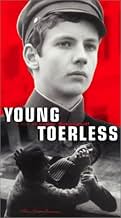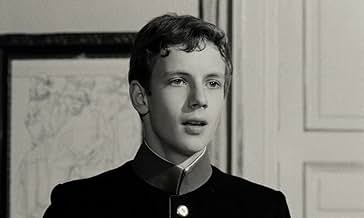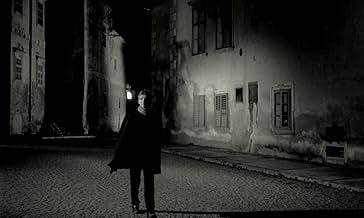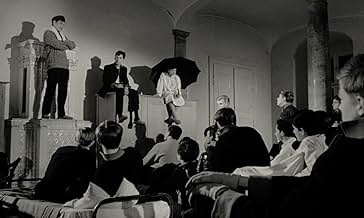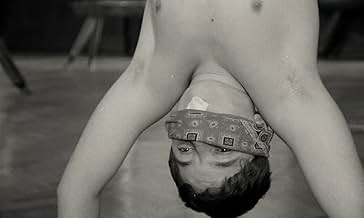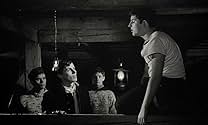IMDb RATING
7.2/10
2.8K
YOUR RATING
In a boarding school, a student observes in passive disgust as his two friends manipulate, humiliate and torture a fellow student, justifying their every act.In a boarding school, a student observes in passive disgust as his two friends manipulate, humiliate and torture a fellow student, justifying their every act.In a boarding school, a student observes in passive disgust as his two friends manipulate, humiliate and torture a fellow student, justifying their every act.
- Director
- Writers
- Stars
- Awards
- 4 wins & 1 nomination total
- Director
- Writers
- All cast & crew
- Production, box office & more at IMDbPro
Featured reviews
Volker Schlondorff has been acclaimed by critics for such films as 'The Tin Drum', 'The Lost Honour of Katherina Blum', and 'Coup de Grace'; all of them films based on fine novels by Gunter Grass, Heinrich Boll and Marguerite Yourcenar respectively, and yet forerunner though he was to the German New Wave Cinema has never been quite given the same acclaim as Wim Wenders, Werner Herzog and Rainer Werner Fassbinder, and I wonder if it is because he films (excellently) from literary sources. His films have a cold look and an enquiring one and 'Young Torless' based on Robert Musil's novel 'The Confusions of Master Young Torless' is one of his best adaptations. The book is as coldly written as the film, and Schlondorff does it justice by using an austere black and white photography, but has as soundtrack Hans Werner Henze's fine if equally emotionless score. Sadly in the current climate of cinema most of these names will seem unknown, lost in the mists of the latter part of the 20th Century. As so many reviewers have given away the plot I will not give in to too many spoilers other than to say it is set on the Austrian-Hungarian border land in an Academy for young male students. In 1906 when it was published there was no such conception of Nazism as we know it, nor was there much in print on sadistic, murderous homosexual torture. Even in 1966 it was brave to put this on film and so unsparingly, and his choice of cast was well chosen. Mathieu Carriere plays the lead role as the 'watcher' and sometimes participator of these perverse pleasures taken by two other students as well as him, and most of the time he looks piously on, studying evil more than opposing it and becomes the worst of all of them as he condones by reason what he sees before him. He is in a way a coward, and unlike the other two admirably played by Bernd Tisch and Fred Diets he hypocritically shows less sexual and sadistic pleasure. I regret that the homosexuality was only obliquely shown, but given the nature of the subject in 1966 it was 'normal' to withdraw the camera for what would have been unacceptable viewing, and only the brutality of the sadism is sickening and fully shown. I give it a 10 for its brilliant attempt to tackle the Musil book and there is a certain failure in the director's approach by him being too cautious, but all the same it succeeds on so many levels that I feel it deserves a 10. It was unique then, and should not be as forgotten as it is now, and was in its way also a forerunner of openly homosexual subject matter. Its political aspects are made too much of as in my opinion it shows the savagery of men hidden away behind polite surfaces; a subject matter as controversial as it is still, and I am thinking of the recent film 'Goat' dealing with hazing in modern Academic schools which has equally been given less distribution than it should have been.
people should not be distracted about the specifics of the plot,or the tangential,secondary themes of cruelty/sexuality..schlondorf has made his metaphor clear and passionate..people in positions of power(due to talent,wealth,titles of authority,physical stregnth,etc)are not entitled to abuse others,no matter what their alleged justification;and people who witness such abuses and do nothing are worse than enablers, they are accomplices..the obvious association is with the Nazis,but this is a universal problem that could be likened to the Spanish inquisition,the salem witch trials,the torture of prisoners during the iraq war,the red scare hearings and countless others..my own feel is that torless is held up as someone who contributes mightily to this particular evil,but fools himself into thinking he's not involved..his final speech was a lame attempt to justify his conduct..the film may not have been entertaining,but it was thought-provoking
The movie won an award at the Cannes Film Festival when it was first released and signaled the beginning of a German cinematic revival. The book was written in 1906 and is a tedious read, although thankfully a short book. Homosexuality plays a large role in the book but virtually does not exist in the movie. Torless, a horny teenager in an all boys school, eventually has a torrid sexual affair with one of the students. The movie chooses to ignore this, and maybe for good reason as it was released in I believe in 1966. Filmed in black and white, the lack of color contributes to the atmosphere of German austerity that director uses to his advantage. The final speech by Torless is a brilliant defense for the lack of opposition by the middle class to the rise of Hitler. Most of the teenagers in the movie were not aspiring actors but were chosen almost at random for their roles. But considering the time in which it was produced this is a land mark film, especially for German cinema. The movie is much more entertaining than the book and the director,Volker Schlondorff, did a fabulous job and deserves the awards it was given.
By today's standards, a film like "Young Torless" may seem too coy and archly philosophical (and thus pretentious) a take on the corruption of youth, and the sources from which the corruption stems. Its strength, however, lies in the telling: when a student at a preparatory academy robs a peer to pay off a debt, he finds himself enslaved, both psychologically and sexually, by a gang of rogues looking to push him to the breaking point. In the midst of this is Torless (Matthieu Carriere), a student coming to terms with his identity in the midst of this moral dilemma, and whose mental landscape renders him a frustrated, conflicted character who runs the gamut from cold detachment to vague sympathy. While certain aspects of the film (the homosexual subplot, for instance) seem deliberately repressed due to the era, the implication is enough to give the events an additional potency. The black-and-white cinematography is excellent, capturing a specific atmosphere of dread and meditative solitude--German director Volker Schlondorff is not looking to titillate with sensationalist content, but instead spin a story of a young adult's struggle with the evils of an imperfect world. And on that level, "Young Torless" is one of the best films of its kind.
Faithfully adapted from author Robert Musil, this study of sadism and masochism among students at an Austro-Hungarian boys prep school is a parable of fascism and its origins. Barbara Steele is radiant and splendid as Bozena the prostitute who awakens the nascent sexual nature of the adolescent students. Lovingly photographed in black and white, YOUNG TORLESS evokes the mood and claustrophobic horror of the dehumanizing military system. Matthew Carriere gives an unblemished and heartfelt performance as an innocent caught behind the barbed wire walls of his very soul and the duty to which he has been placed. A must-see for everyone and an advocacy for pacificism. This was Volker Schloendorff's first film, and by admission one of Barbara Steele's favorite roles.
Did you know
- TriviaLuchino Visconti had previously tried to set up a version of " Young Torless " with Romy Schneider starring.
- Quotes
Thomas Törless: Yet another day to tell our grandchildren about.
- ConnectionsFeatured in Film Review: International Films (1968)
- How long is Young Törless?Powered by Alexa
Details
- Runtime
- 1h 27m(87 min)
- Color
- Sound mix
- Aspect ratio
- 1.66 : 1
Contribute to this page
Suggest an edit or add missing content

